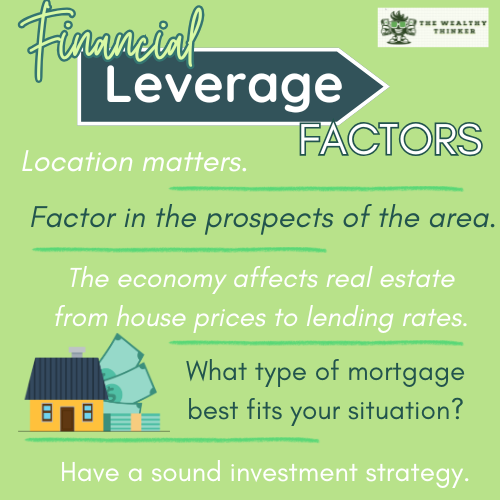Financial leverage is a strategy that allows investors to use borrowed money to increase their potential returns.
Rather than relying solely on personal savings, leverage gives individuals and businesses the opportunity to finance investments with external funds, multiplying their purchasing power.
In real estate, leverage plays a key role in expanding investment opportunities.
By using a mortgage or other financing methods, investors can acquire properties of higher value than they could afford with cash alone. This approach can accelerate wealth-building, increase equity, and enhance returns—especially when property values rise over time.
However, while leverage offers significant financial advantages, it also carries risks.
Poor planning, high interest rates, or economic downturns can turn leverage into a liability instead of an asset. That’s why understanding how to use it effectively is crucial for making smart investment decisions.
In this article, we’ll explore how financial leverage works, how it can be applied to real estate investing, and the key factors to consider when using it to your advantage. Whether you’re new to real estate or looking to refine your investment strategy, mastering the power of leverage can help you maximize your financial potential.

What is Financial Leverage?
Financial leverage is a strategy that involves using borrowed money to boost investment returns.
In business, it refers to the amount of debt a company takes on to fund its assets.
In real estate, leverage means using a loan to buy property instead of paying the full price upfront. This allows you to invest in a higher-value property and potentially increase your returns.
By borrowing money, you can buy more valuable assets and grow your equity faster than if you relied only on your own cash.
The Power of Financial Leverage
Many people don’t understand the benefits of using leverage to buy real estate. Here’s how it plays out in practice.
For example, an investor has $100,000 to put toward single-family rental real estate. There are a number of options for how to use this capital, including:
Option 1
Buy a $100,000 property for cash.
This approach produces no leverage.
Option 2
Put the $100,000 toward the purchase of a $200,000 property, using financing like a bank mortgage loan to cover the other $100,000.
This produces 50% leverage.
Option 3
Put the $100,000 toward the purchase of two $200,000 properties, again using financing to cover the remainder of the purchase price.
This produces 75% leverage (assuming a $50,000 down payment) and spreads your potential gains and risks over two properties.
If property values increase 6%, the investor achieves these gains based on appreciation alone:
- Option 1: $106,000 property value for a $6,000 gain on the cash invested.
- Option 2: $112,000 property value for a $12,000 gain on the cash invested.
- Option 3: $224,000 property value for a $24,000 gain on the cash invested.
Thanks to the principle of leverage, each of these returns can be realized using the same capital of $100,000. In essence, the more leverage an investor uses, the higher the potential returns from asset appreciation.
Seasoned real estate investors know that not every property makes money, especially in the short term.
By using leverage, investors can diversify their real estate portfolio by buying more property and spreading the risk to reduce potential losses from vacancy loss, a decline in value, capital improvements, etc.
Factors to consider when leveraging
Though leverage allows investors to optimize gains from real estate with less capital, it could also lead to losses if not properly utilized.
Just like most investments, timing is critical when using leverage for real estate. Leverage is most effective when property values and rents are on the rise.
On the flip side, when house values and rents stagnate or decline, the advantage provided by leverage can quickly disappear as your loan payments increase your carrying cost for the property.
Also, interest rates can affect how you profit from leverage. If mortgage rates are high, this implies you would be paying higher interest rates on your loan. As such, it is advisable to leverage when interest rates are low or convenient.
How to Use Leverage Effectively
To use leverage effectively, there are certain factors that real estate investors have to consider.
Location
Location matters in real estate, and is the most important factor when estimating investment prospects.
Proximity to amenities, scenic views, markets, transport hubs, and tax-exempt areas play an important role in commercial property valuations.
Prospects
Though you may have found a location that suits your present investment plans, it could have dim prospects in the future.
When considering location, you also have to factor in the prospects of the area in your calculations.
- Would the area develop 5 to 10 years from now, or would it become overcrowded and diminish in value?
Considering that you are using loans to finance your property purchase in the long term, it is important that you consider factors that would affect the property’s value in the long term.
Thoroughly review the ownership and intended usage of the immediate areas where you plan to invest. Try to collect as much information as possible on the prospects of the vicinity where you are considering buying property.
Macroeconomy
The economy affects real estate from house prices to lending rates.
It also determines housing buying choices. For example, if rent prices are rising faster than home prices, then more people would be inclined to buy their own homes rather than renting. Knowing how macroeconomic themes like inflation, recession, interest rates, etc. affect the potency of leverage can save you from losses.
Investment strategy
Having a sound investment strategy enables you to focus on the goals of your real estate investment.
- Is this a short-term or long-term play?
- Is it a hedge against inflation or arbitrage on house prices?
- Do you want to invest in rental property, corporate real estate, or storage units?
Clarifying your investment strategy enables you to understand the nuances in real estate and avoid potential loopholes that may not be obvious if you are just buying properties blindly.
Type of mortgage
Decide on the type of mortgage that best fits your situation—fixed-rate, adjustable-rate mortgage (ARM), interest-only, zero down payment, etc. Note that each type of mortgage has its risk profile and you need to study each carefully.
For instance, ARM includes mortgage rates that can change at any time driven by capital market forces and the borrower must accept any rate changes during the loan term. On the flip side, fixed interests are mortgage rates that remain the same, regardless of the economic condition.
Financial Leverage & How to Use it in Real Estate
Understanding the power of leverage and how to use it in real estate isn’t just for seasoned investors. Taking advantage of leveraging real estate through financing a property can be a sound investment strategy.
Holding onto your leveraged property long-term may not only produce excellent returns but monthly cash flow as well.
However, benefiting from this investment strategy needs knowledge of how factors such as the economy, interest rates and location, etc. affect using leverage profitably. Thankfully, this information is available to all, and not restricted to seasoned investors.
Editor’s note: This article was originally published Aug 19, 2022 and has been updated to improve reader experience.



















